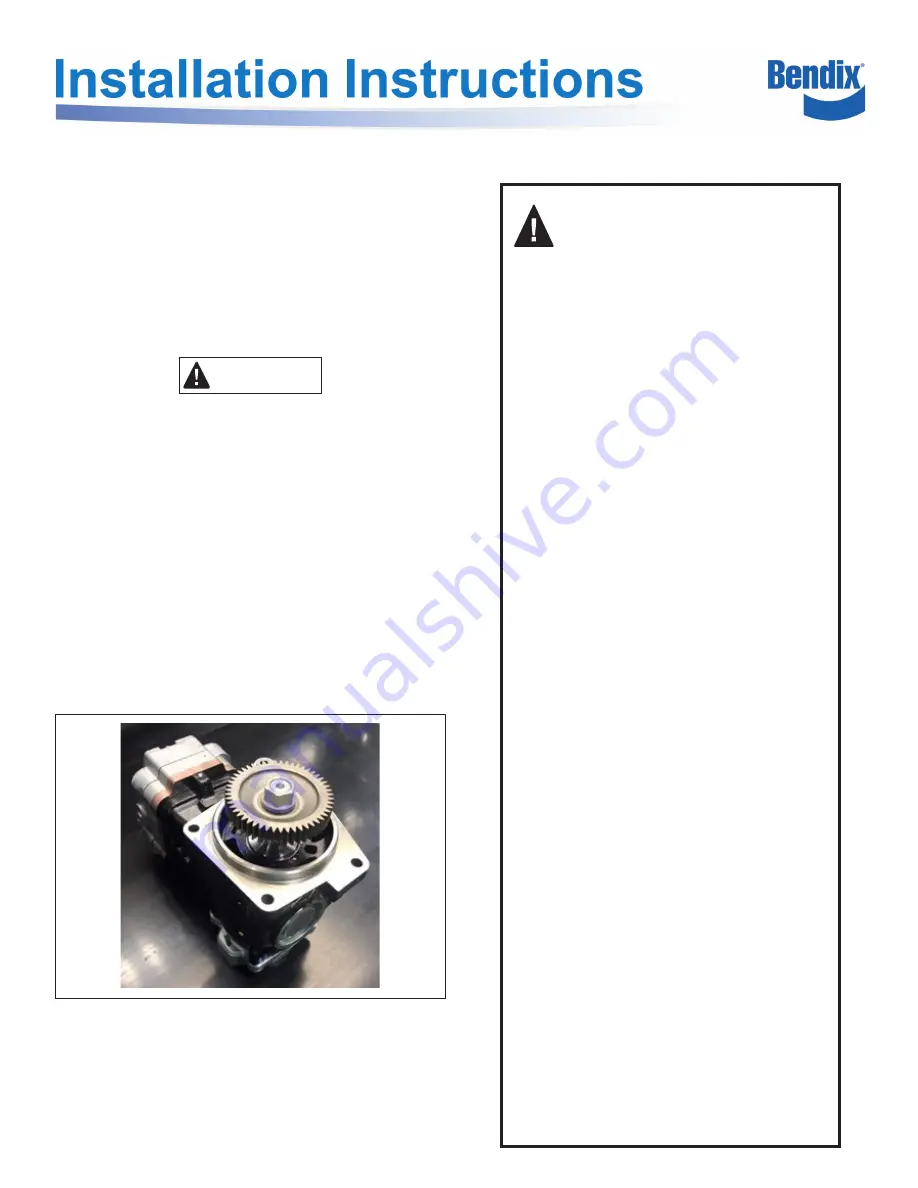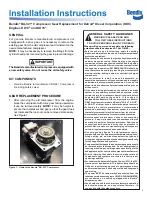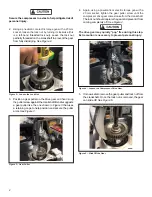
1
GENERAL
For genuine Bendix remanufactured compressors
not
equipped with a drive gear, it is necessary to remove the
existing gear from the old compressor and reinstall it on the
new remanufactured compressor.
NOTE:
It may be necessary to remove the fittings from the
cylinder head prior to removing the gear to prevent damage.
IMPORTANT
The Bendix remanufactured compressor is equipped with
a new safety valve. Do not reuse the old safety valve.
KIT COMPONENTS
• Genuine Bendix remanufactured BA-921 Compressor
(including safety valve)
GEAR REPLACEMENT PROCEDURE
1. After removing the old compressor from the engine,
place the compressor with drive gear facing upward so
it can be removed safely.
NOTE:
It may be helpful to
secure the compressor and gear so that the gear does
not rotate and the lock nut can be removed more easily.
See Figure 1.
Figure 1 – Remove the Bendix
®
BA-921
®
Compressor
Bendix
®
BA-921
®
Compressor Gear Replacement for Detroit
®
Diesel Corporation (DDC)
Engines DD13
®
and DD15
®
GENERAL SAFETY GUIDELINES
WARNING! PLEASE READ AND
FOLLOW THESE INSTRUCTIONS
TO AVOID PERSONAL INJURY OR DEATH:
When working on or around a vehicle, the following
guidelines should be observed AT ALL TIMES:
▲
Park the vehicle on a level surface, apply the parking
brakes, and always block the wheels. Always wear personal
protection equipment.
▲
Stop the engine and remove the ignition key when working
under or around the vehicle. When working in the engine
compartment, the engine should be shut off and the ignition
key should be removed. Where circumstances require that
the engine be in operation, EXTREME CAUTION should be
used to prevent personal injury resulting from contact with
moving, rotating, leaking, heated, or electrically charged
components.
▲
Do not attempt to install, remove, disassemble, or
assemble a component until you have read, and thoroughly
understand, the recommended procedures. Use only the
proper tools and observe all precautions pertaining to use
of those tools.
▲
If the work is being performed on the vehicle’s air brake
system, or any auxiliary pressurized air systems, make
certain to drain the air pressure from all reservoirs before
beginning ANY work on the vehicle. If the vehicle is
equipped with a Bendix
®
AD-IS
®
air dryer system, a Bendix
®
DRM
™
dryer reservoir module, a Bendix
®
AD-9si
®
, AD-HF
®
,
or AD-HFi
™
air dryer, be sure to drain the purge reservoir.
▲
Following the vehicle manufacturer’s recommended
procedures, deactivate the electrical system in a manner
that safely removes all electrical power from the vehicle.
▲
Never exceed manufacturer’s recommended pressures.
▲
Never connect or disconnect a hose or line containing
pressure; it may whip and/or cause hazardous airborne
dust and dirt particles. Wear eye protection. Slowly open
connections with care, and verify that no pressure is
present. Never remove a component or plug unless you are
certain all system pressure has been depleted.
▲
Use only genuine Bendix
®
brand replacement parts,
components, and kits. Replacement hardware, tubing, hose,
fi ttings, wiring, etc. must be of equivalent size, type, and
strength as original equipment and be designed specifi cally
for such applications and systems.
▲
Components with stripped threads or damaged parts should
be replaced rather than repaired. Do not attempt repairs
requiring machining or welding unless specifi cally stated
and approved by the vehicle and component manufacturer.
▲
Prior to returning the vehicle to service, make certain all
components and systems are restored to their proper
operating condition.
▲
For vehicles with Automatic Traction Control (ATC), the ATC
function must be disabled (ATC indicator lamp should be
ON) prior to performing any vehicle maintenance where
one or more wheels on a drive axle are lifted off the ground
and moving.
▲
The power MUST be temporarily disconnected from the
radar sensor whenever any tests USING A DYNAMOMETER
are conducted on a vehicle equipped with a Bendix
®
Wingman
®
system.
▲
You should consult the vehicle manufacturer's operating
and service manuals, and any related literature, in
conjunction with the guidelines above.






















